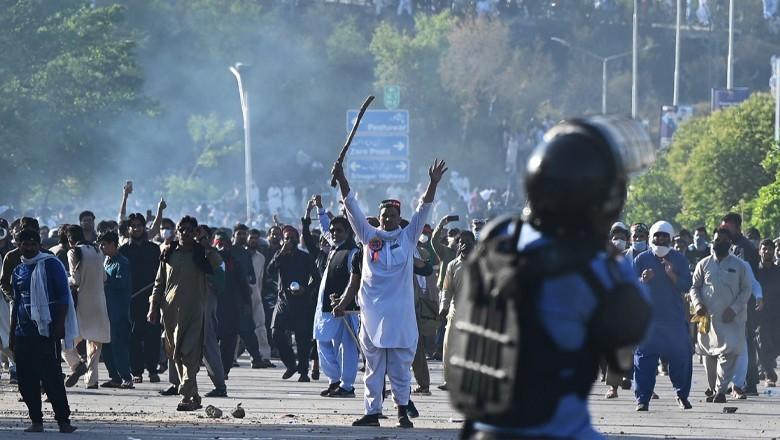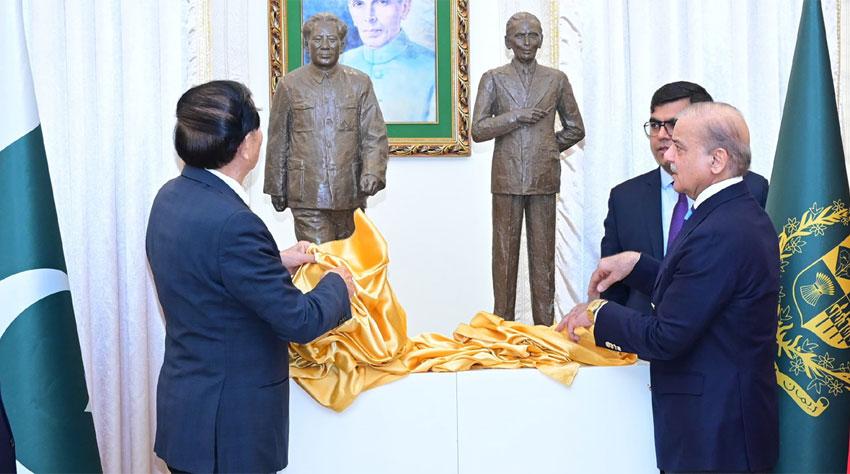Pakistan, Iran condemn Israel's unrestrained military aggression in Middle East
FM of both countries say terrorism, extremism posed a serious threat to regional peace


Islamabad: Pakistan and Iran on Tuesday condemned Israel’s unrestrained military aggression in the Middle East and its genocidal actions against innocent civilians, and questioned the international community’s failure to stop the Zionist regime from its violation of international laws and UN Charter.
In a joint press stakeout following their meeting, Deputy Prime Minister and Foreign Minister Ishaq Dar and Iranian Foreign Minister Seyed Abbas Araghchi told the media that Israel’s illegal measures in occupied territories, in violation of international law, international humanitarian law, and the UN Charter, constituted the root cause of all tensions in the Middle East.
Besides exchanging views on the current situations and developments in the Middle East and across the globe, both sides discussed focusing on the Middle East crisis, the denial of the right to self-determination, and the need for upholding international law and advancing accountability.
In his remarks, Dar said that both sides emphasized the need for reaching an urgent ceasefire, de-escalation, and dialogue, aiming to realize the right of self-determination for the Palestinian people.
He recalled Pakistan’s timely and strong condemnation of Israel’s military strikes on Iran in grave violation of Iran’s sovereignty.
Dar reiterated the call for establishing a viable, independent, and contiguous state of Palestine on the basis of pre-1967 borders, with Al-Quds Al-Sharif as its capital.
“We reject the propensity by occupying powers to equate the right of self-determination with terrorism, which is nothing but a ploy to prolong their occupation and apartheid policies. The long-standing Palestinian issue and the issue of Jammu and Kashmir, which are based on the denial of the right to self-determination, must be addressed through peaceful means, fully respecting the rights and aspirations of the affected populations, in line with relevant United Nations resolutions and the UN Charter,” he remarked.
He told the media that both sides also discussed ways and means to enhance cooperation across several key areas, including trade, energy, and border security, besides agreeing to intensify collaboration on border management and address shared challenges.
The two foreign ministers underscored that terrorism and extremism posed a serious threat to regional peace and pledged to coordinate their joint efforts to eradicate these challenges.
Dar thanked his Iranian counterpart for Iran’s support for Pakistan’s membership at the BRICS Forum, and also the pilgrims visiting holy places in Iran.
As both leaders are scheduled to meet at the upcoming Joint Islamic Summit in Jeddah, they agreed to pool their efforts to ensure coming up with a joint approach to the issues for which this Joint Summit has been called.
Iranian Foreign Minister Seyed Abbas Araghchi said that Israeli regime had committed blatant crimes and acts of genocide in Gaza and continued its widespread aggression in Lebanon and other places. These crimes have now spread to Lebanon. The Zionist regime further displayed its belligerent and aggressive nature by attacking Iran on October 26th, he added.
“Unlike the Israeli regime, the Islamic Republic of Iran does not seek escalation; however, we reserve our inherent right to legitimate defense under Article 51 of the United Nations Charter, and we will certainly respond to the Israeli aggression at the appropriate time and in a measured and well-calculated manner,” he commented.
The Iranian foreign minister appreciated the strong and commendable stance of the government and people of Pakistan in condemning the Zionist regime’s aggression against Iran.
“Pakistani authorities, particularly the honorable Prime Minister of Pakistan, have taken a strong and clear position for which we are deeply appreciative. The government and people of Pakistan have also shown significant support for the people of Gaza and the Palestinian cause over the past year.”
He said that unfortunately, the international community had failed to stop the Zionist regime from continuing its genocide and acts of aggression, which endanger both regional and international peace and security.
He said both sides reiterated their commitment and dedication to further strengthening their cooperation in all areas, including economic, trade, political, academic, cultural, and tourism activities.
Calling the phenomenon of terrorism a shared and common threat to the two countries and the whole region, as well as a collective threat on a global scale to the entire international community, both foreign ministers reiterated their commitment to address and combat this phenomenon bilaterally through mutual collaborations and with the cooperation of regional countries.
Foreign Minister Seyed Abbas Araghchi also extended an invitation to Ishaq Dar to pay an official visit to Iran, and also participate in the upcoming ECO ministerial meeting in Tehran.












